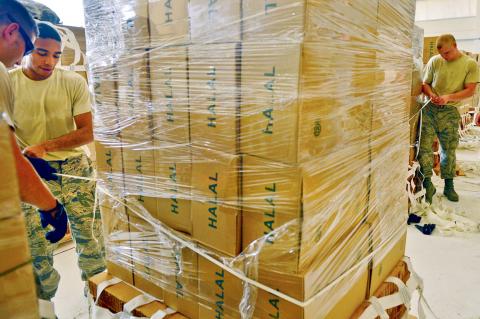The US launched its first airstrikes in northern Iraq against militants of the Islamic State group on Friday amid a worsening humanitarian crisis that has seen the extremists take captive hundreds of women from a religious minority, an Iraqi official said, while thousands of other civilians fled in fear.
Many US allies backed the intervention, pledging urgent steps to assist the legions of refugees and displaced people. Those in jeopardy included thousands of members of the Yazidi religious minority whose plight — trapped on a mountaintop by the militants — prompted the US to airdrop crates of food and water for them.
US planes made a second airdrop of food and water early yesterday for those trapped in the Sinjar mountains, Pentagon spokesman US Rear Admiral John Kirby said.

Photo: AFP / US AIR FORCE / Staff Sergeant Vernon Young Jr
Escorted by two US Navy fighter jets, three planes dropped 72 bundles of supplies for the refugees, including more than 28,000 meals and more than 5,700 liters of water, said Kirby, who spoke from New Delhi during a trip with US Secretary of Defense Chuck Hagel.
The Islamic State’s “campaign of terror against the innocent, including the Yazidi and Christian minorities, and its grotesque and targeted acts of violence bear all the warning signs and hallmarks of genocide,” US Secretary of State John Kerry said. “For anyone who needed a wake-up call, this is it.”
Underscoring the sense of alarm, a spokesman for Iraq’s Human Rights Ministry said hundreds of Yazidi women had been seized by the militants.
Citing reports from the women’s families, Kamil Amin said some of the women were being held in Iraq’s second-largest city, Mosul.
“We think that the terrorists by now consider them slaves and they have vicious plans for them,” Amin told reporters. “We think that these women are going to be used in demeaning ways by those terrorists to satisfy their animalistic urges in a way that contradicts all ... human and Islamic values.”
The US military used two F/A-18 jets to drop bombs on a piece of artillery and the truck towing it. The Pentagon said the militants were using the artillery to shell Kurdish forces defending Erbil, the capital of Iraq’s autonomous Kurdish region and home to a US consulate and about three dozen US military trainers.
Later on Friday, the US launched a second round of airstrikes near Erbil, US officials said. The officials, speaking on condition of anonymity because they were not authorized to discuss the strikes publicly, said unmanned aircraft hit a mortar, and four US Navy F/A-18 fighters destroyed a seven-vehicle convoy.
Meanwhile, US President Barack Obama yesterday vowed to continue airstrikes against Iraqi jihadists if needed to protect US diplomats and military advisers.
Speaking in his weekly address, Obama said that he had authorized the strikes in Iraq to protect US personnel serving in the northern Kurdish city.
“And, if necessary, that’s what we will continue to do,” he said.

The US government has signed defense cooperation agreements with Japan and the Philippines to boost the deterrence capabilities of countries in the first island chain, a report by the National Security Bureau (NSB) showed. The main countries on the first island chain include the two nations and Taiwan. The bureau is to present the report at a meeting of the legislature’s Foreign Affairs and National Defense Committee tomorrow. The US military has deployed Typhon missile systems to Japan’s Yamaguchi Prefecture and Zambales province in the Philippines during their joint military exercises. It has also installed NMESIS anti-ship systems in Japan’s Okinawa

TRAGEDY STRIKES TAIPEI: The suspect died after falling off a building after he threw smoke grenades into Taipei Main Station and went on a killing spree in Zhongshan A 27-year-old suspect allegedly threw smoke grenades in Taipei Main Station and then proceeded to Zhongshan MRT Station in a random killing spree that resulted in the death of the suspect and two other civilians, and seven injured, including one in critical condition, as of press time last night. The suspect, identified as a man surnamed Chang Wen (張文), allegedly began the attack at Taipei Main Station, the Taipei Fire Department said, adding that it received a report at 5:24pm that smoke grenades had been thrown in the station. One man in his 50s was rushed to hospital after a cardiac arrest

‘WIN-WIN’: The Philippines, and central and eastern European countries are important potential drone cooperation partners, Minister of Foreign Affairs Lin Chia-lung said Minister of Foreign Affairs Lin Chia-lung (林佳龍) in an interview published yesterday confirmed that there are joint ventures between Taiwan and Poland in the drone industry. Lin made the remark in an exclusive interview with the Chinese-language Liberty Times (the Taipei Times’ sister paper). The government-backed Taiwan Excellence Drone International Business Opportunities Alliance and the Polish Chamber of Unmanned Systems on Wednesday last week signed a memorandum of understanding in Poland to develop a “non-China” supply chain for drones and work together on key technologies. Asked if Taiwan prioritized Poland among central and eastern European countries in drone collaboration, Lin

ON ALERT: Taiwan’s partners would issue warnings if China attempted to use Interpol to target Taiwanese, and the global body has mechanisms to prevent it, an official said China has stationed two to four people specializing in Taiwan affairs at its embassies in several democratic countries to monitor and harass Taiwanese, actions that the host nations would not tolerate, National Security Bureau (NSB) Director-General Tsai Ming-yen (蔡明彥) said yesterday. Tsai made the comments at a meeting of the legislature’s Foreign Affairs and National Defense Committee, which asked him and Minister of National Defense Wellington Koo (顧立雄) to report on potential conflicts in the Taiwan Strait and military preparedness. Democratic Progressive Party (DPP) Legislator Michelle Lin (林楚茵) expressed concern that Beijing has posted personnel from China’s Taiwan Affairs Office to its